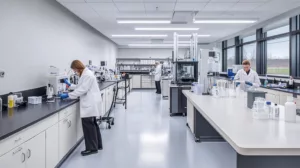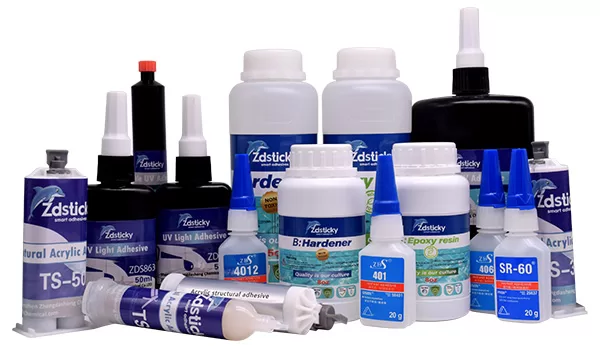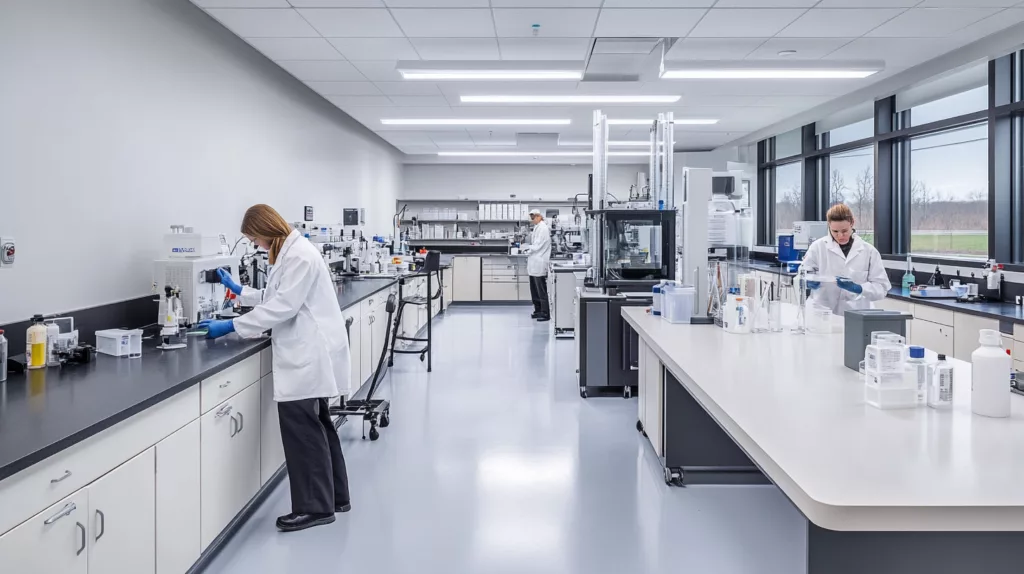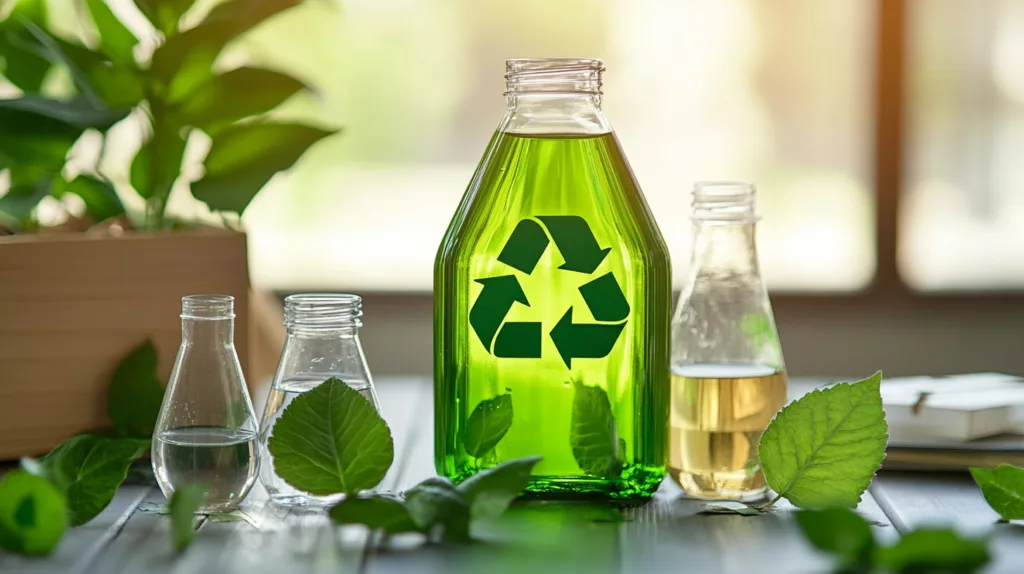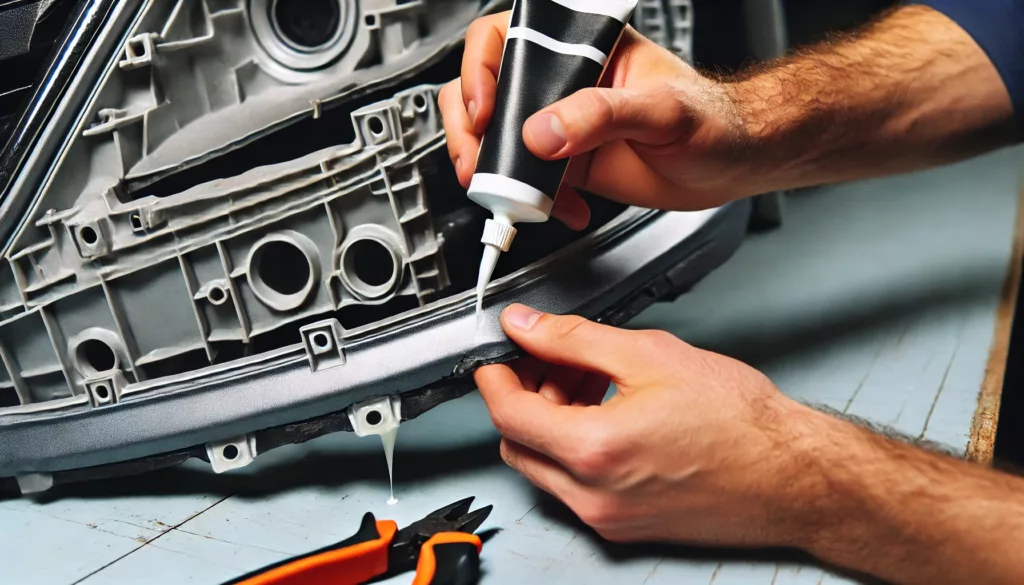 When it comes to repairing or reattaching car plastic, choosing the right adhesive is critical. Cars are made of various plastic components, both inside and outside, such as bumpers, dashboards, trim pieces, and door panels. These materials must withstand exposure to heat, vibrations, moisture, and even UV radiation, making the choice of adhesive more than just a matter of convenience—it’s about ensuring durability and performance. This guide will help you find the best glue for reattaching car plastic and explain how to use it effectively.
When it comes to repairing or reattaching car plastic, choosing the right adhesive is critical. Cars are made of various plastic components, both inside and outside, such as bumpers, dashboards, trim pieces, and door panels. These materials must withstand exposure to heat, vibrations, moisture, and even UV radiation, making the choice of adhesive more than just a matter of convenience—it’s about ensuring durability and performance. This guide will help you find the best glue for reattaching car plastic and explain how to use it effectively.
Why Choosing the Right Glue for Car Plastic Matters
Car plastics are not ordinary materials—they’re designed for specific functions, like flexibility, strength, or aesthetic appeal. Unlike household plastics, automotive plastics are often made from materials such as polypropylene (PP), polyethylene (PE), or acrylonitrile butadiene styrene (ABS). Each of these has unique properties and reacts differently to adhesives.
Using the wrong glue can lead to weak bonds, cracking, or even damage to the plastic itself. The right adhesive should provide a strong, durable bond while being able to handle environmental stressors like heat, vibration, and moisture. Whether you’re fixing a cracked bumper, a loose trim, or a broken dashboard, selecting the proper adhesive is crucial for a reliable repair.
Types of Adhesives for Car Plastic Repairs
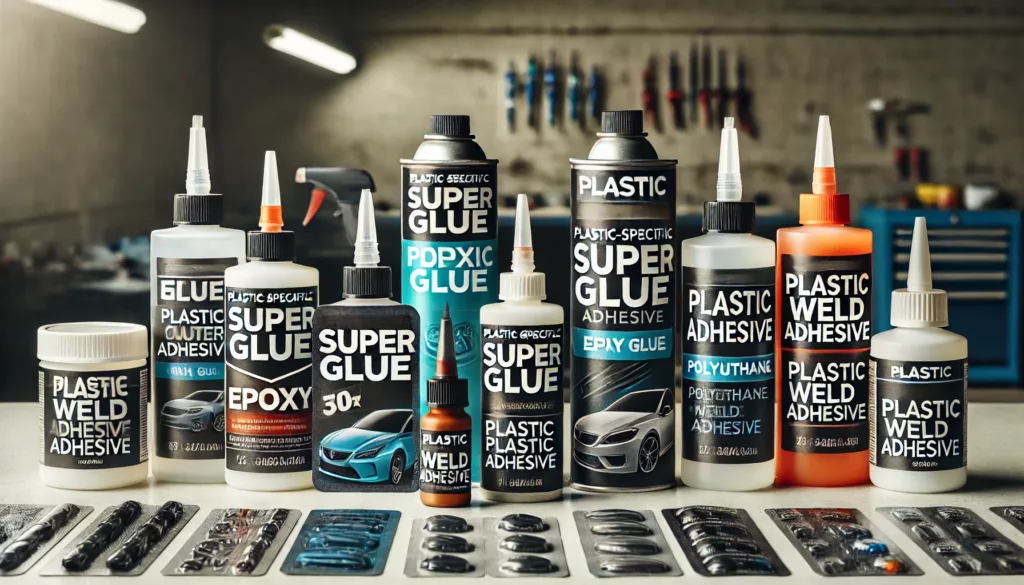
Epoxy Adhesives
Epoxy adhesives are one of the most reliable options for reattaching car plastic. These two-part adhesives consist of a resin and a hardener that mix to create an incredibly strong bond. Epoxy is particularly useful for fixing structural components like bumpers and panels because it offers excellent resistance to heat, water, and impact.
- Best For: Bumpers, exterior trims, and structural repairs.
- Advantages: Extremely strong, heat-resistant, and weatherproof.
- Disadvantages: Requires precise mixing and application.
Plastic-Specific Super Glue (Cyanoacrylate)
Super glue is a popular option for quick repairs due to its ease of use and fast bonding time. Plastic-specific formulas are available, designed to work effectively on automotive plastics like PP and PE, which are notoriously hard to bond. However, it’s best suited for small repairs rather than heavy-duty applications.
- Best For: Interior trims, small cracks, and lightweight parts.
- Advantages: Quick-drying, easy to apply.
- Disadvantages: Brittle bonds that may not withstand vibrations.
Polyurethane Adhesives
Polyurethane adhesives are flexible and strong, making them an excellent choice for areas subject to vibrations or movement. These adhesives create a weatherproof and durable bond, ideal for both interior and exterior repairs.
- Best For: Bumpers, weather strips, and exterior plastic parts.
- Advantages: Highly flexible, UV-resistant, and waterproof.
- Disadvantages: Longer curing time compared to super glue.
Silicone-Based Adhesives
Silicone adhesives are known for their flexibility and waterproof properties. They work well for sealing and attaching non-structural components but may not provide the strength needed for heavy-duty repairs.
- Best For: Sealing gaps, weatherproofing, and non-structural parts.
- Advantages: Flexible, weatherproof, and heat-resistant.
- Disadvantages: Weak structural bonding strength.
Plastic Weld Adhesives
Plastic weld adhesives chemically bond plastics together, creating a permanent and extremely strong connection. This type of adhesive is ideal for polypropylene and polyethylene plastics, which are notoriously difficult to glue with traditional adhesives.
- Best For: Hard-to-bond plastics like PP and PE.
- Advantages: Permanent bond, excellent durability.
- Disadvantages: Requires precision and specific application tools.
Factors to Consider When Choosing Glue for Car Plastic
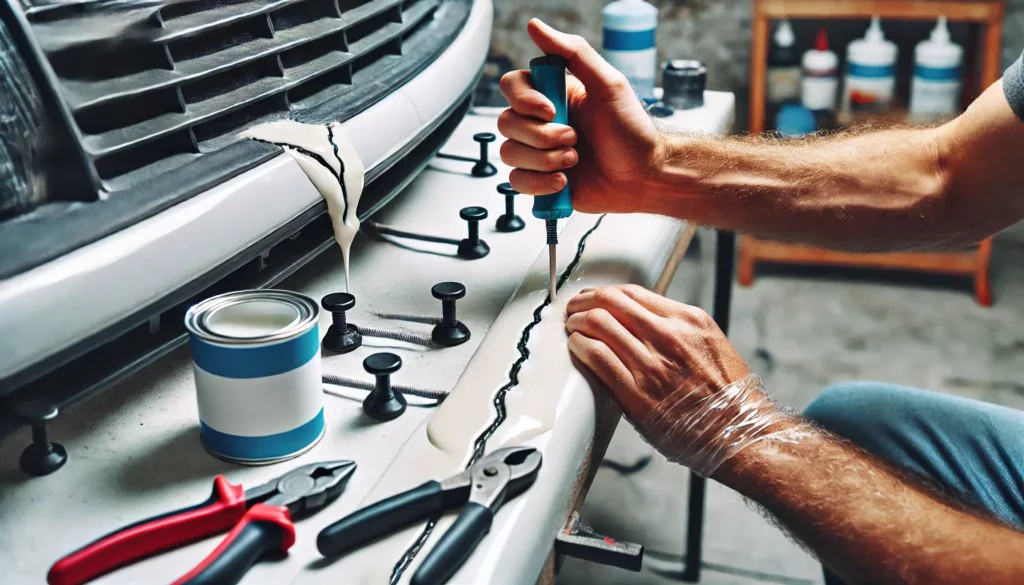
- Type of Plastic
Check the plastic identification code on the part you’re repairing. Common codes include PP, PE, ABS, and PVC. Different adhesives are suited for different types of plastic. - Application Area
Determine if the repair is for an interior or exterior component. Exterior parts require adhesives that can handle UV exposure, heat, and moisture. - Strength and Flexibility
Structural repairs like bumpers or panels need adhesives with high tensile strength, while flexible parts require adhesives with elasticity. - Curing Time
If you need a quick fix, go for super glue or fast-curing epoxy. For long-term repairs, adhesives with longer curing times may provide better results. - Weather Resistance
Outdoor repairs need adhesives that can withstand temperature fluctuations, UV radiation, and moisture.
Top Recommended Glues for Car Plastic
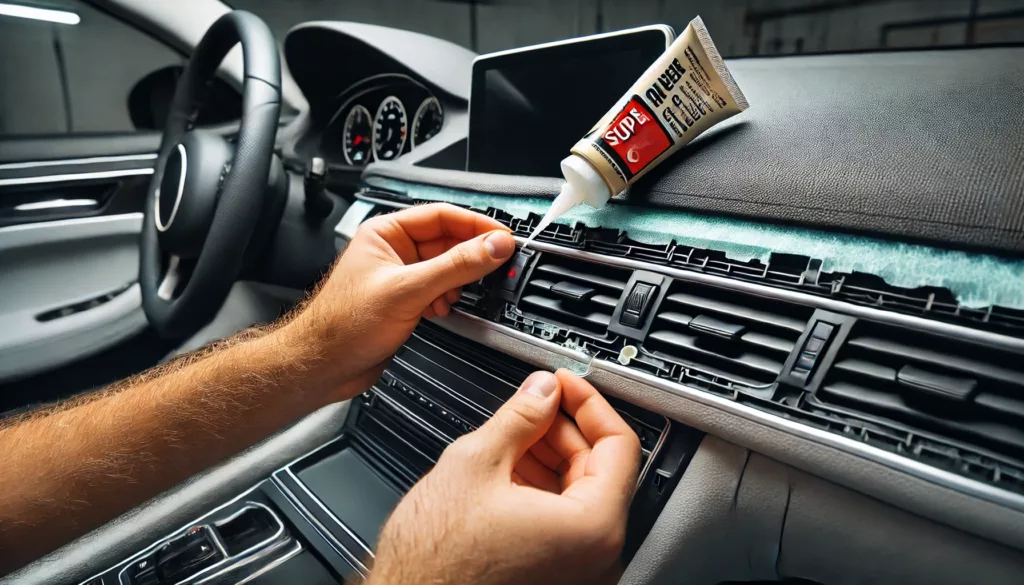
J-B Weld Plastic Bonder
This two-part epoxy adhesive is ideal for structural repairs. It bonds hard-to-stick plastics like polypropylene and polyethylene and cures quickly with a durable finish.
- Key Features: Heat-resistant, strong bond, sets in 15 minutes.
Loctite Plastics Bonding System
A super glue specifically designed for hard-to-bond plastics, this adhesive includes a primer for maximum bonding strength.
- Key Features: Fast-drying, strong for small repairs.
Gorilla Heavy Duty Construction Adhesive
This polyurethane-based adhesive is perfect for exterior repairs. It’s waterproof, UV-resistant, and bonds most car plastics securely.
- Key Features: Weatherproof, flexible, and versatile.
3M Plastic Emblem and Trim Adhesive
Specially formulated for attaching automotive trims and emblems, this adhesive provides a flexible yet strong bond that can handle vibrations and weather.
- Key Features: Quick curing, flexible bond for trims and emblems.
ZDS™ Automobile Adhesive
ZDS™ Automobile Adhesive is a premium adhesive designed specifically for car plastic repairs. Its unique formulation works on a wide range of automotive plastics, including ABS, polypropylene, and polyethylene. This adhesive provides a strong, durable bond that withstands heat, moisture, and vibrations, making it an excellent choice for both interior and exterior repairs.
- Key Features:
- Compatible with hard-to-bond plastics like ABS, PP, and PE.
- Heat-resistant and waterproof.
- Provides high tensile strength for structural and non-structural repairs.
How to Reattach Car Plastic Using Glue
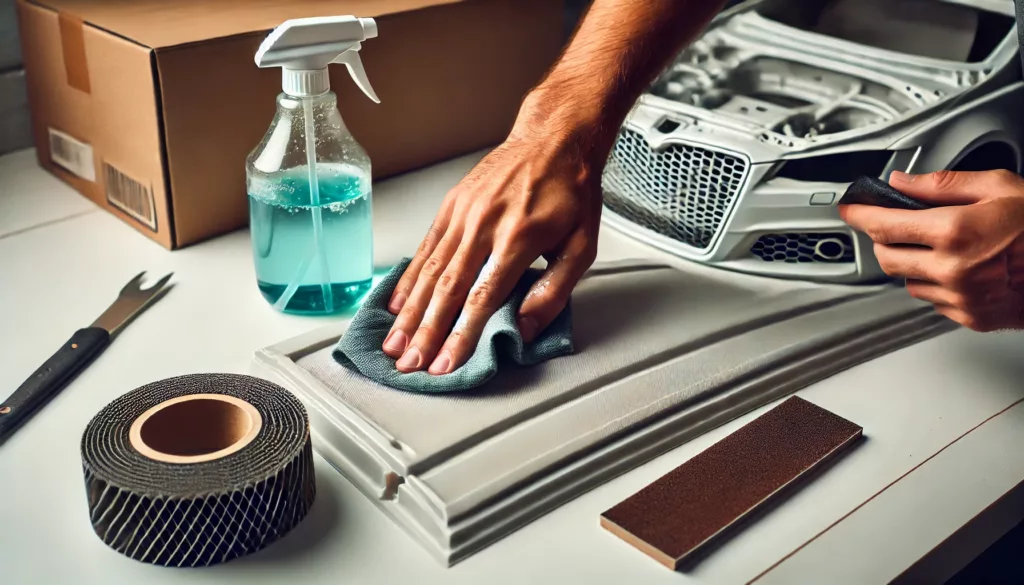
- Clean the Surface
Remove dirt, grease, and old adhesive from the plastic surface using rubbing alcohol or a plastic-safe cleaner. - Roughen the Surface
Use sandpaper to lightly scuff the area for better adhesive bonding. - Apply the Glue
Follow the manufacturer’s instructions for the adhesive. Apply an even layer of glue to one or both surfaces, depending on the adhesive type. - Press and Secure
Firmly press the parts together and use clamps, tape, or weights to hold them in place while the adhesive cures. - Allow Proper Curing Time
Allow the glue to cure for the recommended time before exposing the repaired area to stress or vibrations.
FAQs
What is the strongest glue for car plastic?
Epoxy adhesives like J-B Weld Plastic Bonder are among the strongest options for car plastic repairs.
Can I use regular super glue on car plastic?
Regular super glue may work for small, non-structural repairs, but plastic-specific super glue is better for automotive plastics.
How long does car plastic glue take to dry?
Drying times vary by adhesive, ranging from a few minutes (super glue) to several hours (epoxy or polyurethane adhesives).
Can I repair a cracked bumper with glue?
Yes, use a strong epoxy or plastic weld adhesive for bumper repairs to ensure durability.
What glue works on polypropylene plastic in cars?
Plastic weld adhesives or specialized bonding systems like Loctite Plastics Bonding System work best on polypropylene.
Is heat resistance important for car plastic glue?
Yes, adhesives used for exterior parts must be heat-resistant to prevent weakening under high temperatures.
Conclusion
Choosing the best glue for reattaching car plastic is essential for a durable and reliable repair. Whether you’re fixing a cracked bumper, loose trim, or broken dashboard, the right adhesive depends on the type of plastic, the location of the repair, and the required strength and flexibility. By following the tips in this guide and using the recommended adhesives, you can ensure your repairs last and keep your car looking and functioning at its best.




